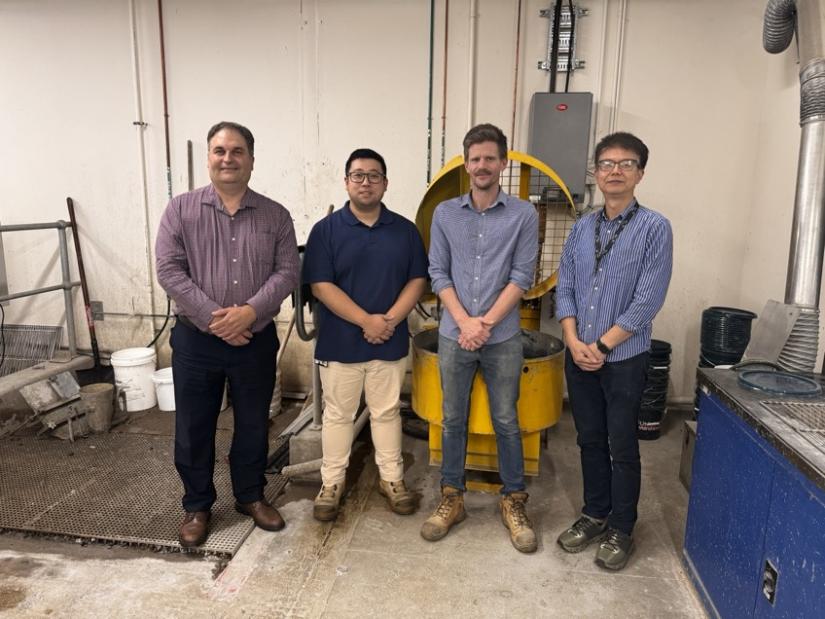An international collaboration between UTS, RHI Magnesita, MCi Carbon and Austrian Institute of Technology is set to position UTS researchers at the forefront of global efforts to achieve a sustainable and resilient future for the construction industry.
Making construction more sustainable

Led by A/Prof. Kirk Vessalas, Head of Discipline of Structural and Materials Engineering and Dr Paul Thomas, Cement Chemist, the UTS team has secured more than $670,000 in international funding as part of a $3.29m boost from the Australia-Austria Industrial Decarbonisation Demonstration Partnership Program.
“This funding will enable UTS to play a crucial role in advancing sustainability through this international research partnership,” said Kirk.
“Our team will be collaborating with the Austrian Climate and Energy Fund and the Australian Department of Climate Change, Energy, the Environment and Water to contribute to raw material analyses and the development of sustainable alternatives to traditional industrial inputs.”
The UTS research team will also facilitate pre-demonstration trials at UTS Tech Lab, testing emerging technologies and helping to scale low-carbon integrated products and solutions that can support the decarbonisation of industries like cement and concrete.
This funding will enable UTS to play a crucial role in advancing sustainability through this international research partnership.
“A major focus of this project will be in reducing carbon emissions associated with the cement and concrete sector, with cement production one of the largest contributors to industrial emissions,” Kirk explained.
The UTS research team is currently developing low-carbon concrete solutions and alternative binders from mineral products with integrated carbon capture capabilities, to reduce the carbon footprint of cement production and lower embodied carbon in concrete.
“These innovations, particularly the use of mineral products as novel supplementary cementitious materials in concrete, have the potential to significantly transform the construction industry globally and drive significant emissions reductions,” Kirk added.
The project builds on a successful CRC (Cooperative Research Centre) collaboration with MCi Carbon that provided a solid foundation for further scaling the technology and advancing its global application.
“The success of our collaboration was greatly supported by the UTS Research Office, whose teams worked strategically to help us secure the necessary funding,” Kirk said.
“Their expertise in aligning UTS’s research priorities with global sustainability goals, navigating funding opportunities and fostering strong academic-industry partnerships was instrumental in facilitating this project’s success.”
Kirk urged all UTS researchers seeking international funding to explore how they can benefit from some of the university’s existing strategic collaborations and industry partnerships.
Their expertise in aligning UTS’s research priorities with global sustainability goals, navigating funding opportunities and fostering strong academic-industry partnerships was instrumental in facilitating this project’s success.
“You should also align your projects to global research priorities,” he said. “When you do this well, you help demonstrate the potential global impact of your research to funding bodies.”
About the project
The $3.29m funding boost from the Australia-Austria Industrial Decarbonisation Demonstration Partnership Program will enable critical advancements in low-carbon product development, process engineering for scaling and industrial integrations through a collaboration between RHI Magnesita, MCi Carbon, the Austrian Institute of Technology and UTS to advance the CCUpScale project.
Since 2023, RHI Magnesita, a global leader in the refractory industry, has invested heavily in Carbon Capture and Utilisation (CCU) technology developed by Australian cleantech company MCi Carbon.
The technology aims to neutralise carbon emissions and transform the refractory industry—one of the most emission-intensive sectors—towards a climate-neutral and sustainable future.
These innovations, particularly the use of mineral products as novel supplementary cementitious materials in concrete, have the potential to significantly transform the construction industry globally and drive significant emissions reductions.
This international partnership is a key step toward building the world’s first CCU pilot plant for the refractory industry in Hochfilzen, Austria, which will capture and convert 50,000 tons of CO2 annually to produce CO2-negative mineral value-added products.
These products will be used in the cement and concrete sector as sustainable and low carbon footprint construction materials, promoting a circular economy and achieving the United Nations Climate Action goal of net-zero emissions by 2050.
What's next?
- Connect with international opportunities
Feature image shows A/Prof. Kirk Vessalas, Dr Jerry Fu, Mr Ben Smith and Dr Jinsong Cao getting ready for their concrete mixing day at the state-of-the-art Service Life and Materials Characterisation facilities at UTS Tech Lab.